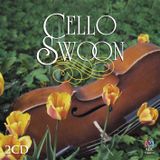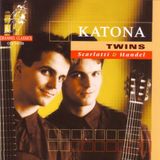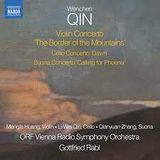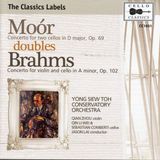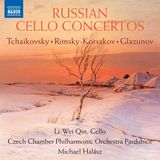"The cello is so versatile. It can portray the lovely, flighty melodies of the soprano, the throaty tenor, and the tension of the dramatic bass. It's wonderful as the soloist and the accompanist."
Chinese-Australian cellist Li-Wei Qin can certainly make his cello sing!
As a child growing up in Shanghai, he played both piano and cello but in the end the cello won out. "Because of its intimacy," he says, "and it touches one's heart more directly."
His formative years were spent in Shanghai and Melbourne after the family emigrated here in 1989. "What Australia has given me is beyond music. The foundation work was done in China, but Australia opened me up. As a country it's very open minded. Even the landscape inspired you to be more expansive, so my time here really taught me how to communicate with my audience."
Li-Wei did postgraduate studies with Ralph Kirshbaum at the Royal Northern College of Music in Manchester and after winning numerous prestigious awards including the Silver medal in the Tchaikovsky International Competition in 1998 and first prize in the Naumburg Competition in New York in 2001 his career as a sought-after soloist and chamber musician was launched in spectacular fashion. In 2002 he was named Young Australian of the Year.
These days Li-Wei is based in Singapore with his wife and two sons, teaching at the Yong Siew Toh Conservatory so "I can give back some of my experience to this region." He also teaches at his alma mater, the RNCM, and is a guest professor at the Shanghai and Central Conservatory of Music in China.
"It's extremely important that a budding musician is very clear about what this profession brings. You cannot be successful or happy if your goal is glory or attention. That is not the path to success. This profession entails a lot of hard work and hardships. You have to be strong mentally."
But all his travels and experiences have not diminished his love of Australia. As he's said many times. "Australia gave me so much performance experience – a great advantage over my British and European colleagues. It helped shape me a lot as a person so it will always be a special kind of home from a certain time in my life."
This year Li-Wei is coming 'home', performing favourite concertos of Elgar, Dvořák, Haydn and Saint-Saëns with Australian orchestras. You'll be able to see him partnering some of the young pianists in this year's Sydney International Piano Competition in July too.
"I wanted my son to grow up here."
Li-Wei's parents met through music. They were both teenage students at the prestigious music boarding school attached to the Shanghai Conservatory. His father Qin Qing became Principal Cellist in the Shanghai Symphony, his mother En Pei Lin, a concert pianist.
From the 1950s, Western music was banned in China and when they tried to emigrate to Australia with their musically gifted son, they encountered many trials.
In 1985 En Pei won a year's contract to lecture in Hobart. Immediately she recalls, "I wanted my son to grow up here."
Her husband suggested she stay on and get her Masters Degree whilst he apply for a tourist visa to join her. Unfortunately, the Chinese government intervened, demanding En Pei return home. Meanwhile they confiscated her husband's and son's visas after she refused.
"My father secretly made a cello for me and taught me how to play it."
Finally, four years later in 1989, the family was reunited in Melbourne. By this time Li-Wei who'd started out learning the piano aged four with his mother in Shanghai, had become a cellist. "My father secretly made a cello for me and taught me how to play it." From the age of eight he progressed very quickly, winning the Junior section of the Chinese National Cello Competition.
In Shanghai, Li-Wei had been exposed to teachers heavily influenced by the Russian school, courtesy of the Russian diaspora that began in earnest after the 1917 Bolshevik revolution.
But after he emigrated to Australia and won scholarships to Melbourne Grammar and the University of Melbourne, his principal teacher was Nelson Cooke, who'd previously been Principal Cello with the Royal Philharmonic and London Symphony Orchestras. So, no surprise, Russian and English repertoire are the foundation of his extensive repertoire which includes contemporary concertos by Australian and Chinese composers.
''Although I was concertising from a very young age, it was not until after university, when I decided to go pro.''
Growing up in the Melbourne suburb of Carnegie, Li-Wei joked about looking for the local hall so he could say he played at Carnegie Hall!
Mind you, despite all his early musical successes, he kept his options open. ''Although I was concertising from a very young age, it was not until after university, when I decided to go pro.''
By this time Li-Wei was already broadcasting concerts 'live' for ABC Classic and playing with the Melbourne Symphony Orchestra. In 1993 he won the Young Performer of the Year Award and in 1997, the 2nd Adam International Cello Competition in New Zealand.
In 1995 he took another big step, deferring his commerce degree and moving to the north of England to study on a scholarship with American cellist Ralph Kirschbaum at the Royal Northern College of Music.
He'd seen Ralph, (the Head of the cello department at the RNCM and founder of the famous Manchester International Cellos Festival) play on tour in Australia. "Although I had scholarships to study at Indiana University and Juilliard School, I was quite convinced by Kirshbaum's teaching after I attended the Manchester Cello Festival."
Li-Wei says he was most impressed "that Kirshbaum showed me that every student needs specific things. Each individual has singular strengths and weaknesses. This greatly influenced my approach to teaching. I always listen very carefully to the needs of the individual students."
"At the end of the concerto I said to myself, 'it's all worth it.'"
Li-Wei left Australia with what he described as "a four-year plan!" To practise intensely in the first year, win domestic and national competitions in the second, international competitions the following year, and in his final year he hoped to secure an agent. If he didn't succeed, he vowed, he'd return to his commerce degree.
Well, as we know he achieved all his goals and even received a professorship at the RNCM aged just 25. He cites his BBC Proms debut in 2003 as being probably his most memorable performance. He played the Prokofiev Cello Concerto, which had never been played in the festival before.
"It was so nerve-wracking, an audience of 5,000 people, BBC Radio and TV 'live' but it went pretty well so it was memorable for that reason too. But when I took the first step and walked onto the stage, that's when I said to myself, 'Li-Wei, why are you doing this to yourself?' At the end of the concerto, I said to myself, 'it's all worth it.'"
"It was a difficult time psychologically … but it was a good time to find new ways to find a purpose in our artistic lives."
I first met Li-Wei Qin when I hosted one of his concerts for ABC Classic in Melbourne in 2000 after I moved back to Australia from Manchester! He was already a broadcasting veteran having given his first ABC concert when he was just 14.
I vividly remember what an intensely expressive, lyrical and communicative musician he was then and have been following his career closely since.
Usually Li-Wei gives upwards of 50 concerts a year. In 2020 he gave five. Like so many other active musicians, covid-19 hit him hard. "It was a difficult time psychologically … but it was a good time to find new ways to find a purpose in our artistic lives."
He did a lot of teaching online and learnt some new and difficult works like the Schnittke Cello sonata and Hindemith Cello Concerto. Even in 2022 back in China where he tours regularly in the northern summer, he had to cram 15 concerts into a five-week period because of a mandatory three-week quarantine.
In February 2022 I was lucky to see Li-Wei give a much-delayed recital at Melbourne Recital Centre with pianist Kristian Chong. The concert had been postponed twice since 2020 because of the Melbourne lockdowns.
What will always stay with me beyond the compelling performances we witnessed were Li-Wei's words to the audience at the end of the program when he spoke of the challenges musicians had faced when concert life died world-wide and his gratitude to be back playing for 'live' audiences again. Then he and Kristian played the perfect encore: Somewhere Over the Rainbow.
Mairi Nicolson presents Lunchtime Concert, The Opera Show and Sunday Opera on ABC Classic.
